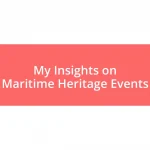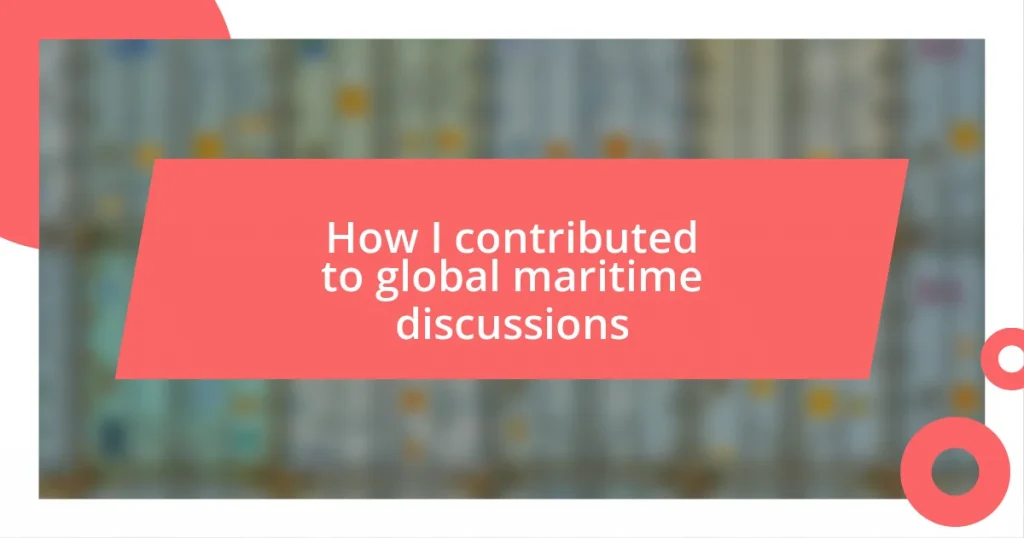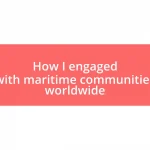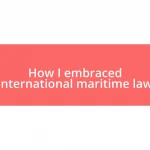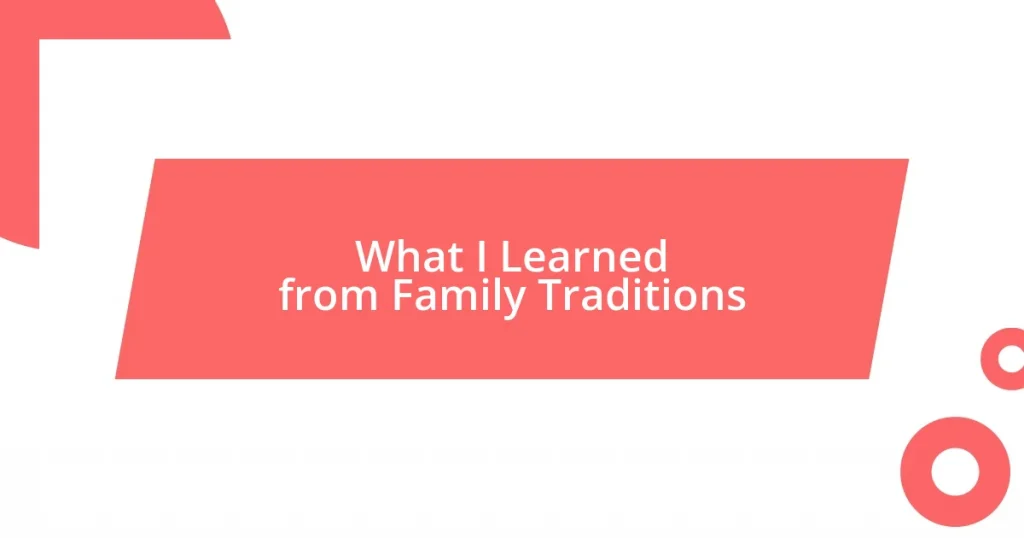Key takeaways:
- Participation in global maritime conferences fosters dialogue on critical issues like piracy, sustainable shipping, and the impact of climate change on shipping routes.
- Key international organizations, such as the IMO and ICS, are vital for shaping maritime policies and promoting safety and sustainability through collaboration.
- Future maritime dialogue should focus on incorporating emerging technologies and diverse voices to enhance transparency, inclusivity, and innovative solutions for ecological challenges.
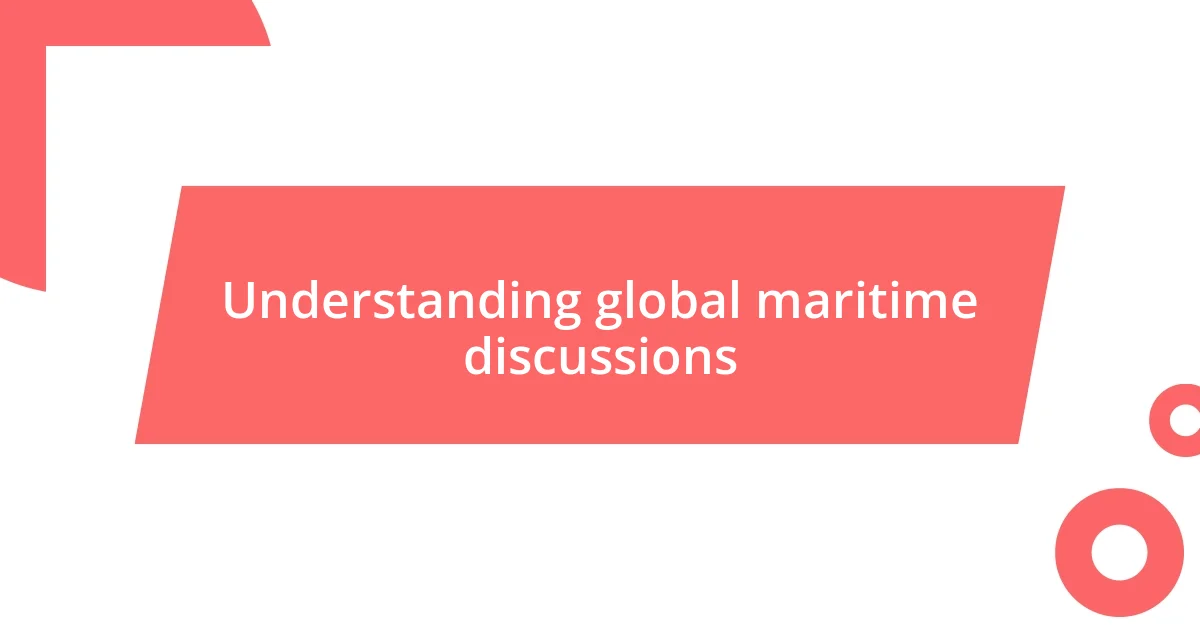
Understanding global maritime discussions
Global maritime discussions encompass a wide range of critical topics, from trade policies to environmental concerns. As I dove into this complex world, I found myself fascinated by how interconnected our oceans are to global economies and ecosystems. Have you ever considered how a single shipping route could affect climate change thousands of miles away?
In my experiences attending maritime conferences, I often felt the palpable tension in the room when discussing piracy and illegal fishing. It struck me how these issues aren’t just abstract concepts; they impact the livelihoods of countless individuals. The stories shared by delegates from coastal communities brought a human element to the negotiations, reminding me that behind every statistic, there’s a person affected.
I vividly recall a session dedicated to sustainable shipping practices where one speaker passionately advocated for greener technologies. The energy was infectious! It got me thinking—if we prioritize sustainability in maritime discussions, could we create a legacy of cleaner oceans for future generations? That moment reaffirmed my belief in proactive dialogue that leads to tangible change on a global scale.
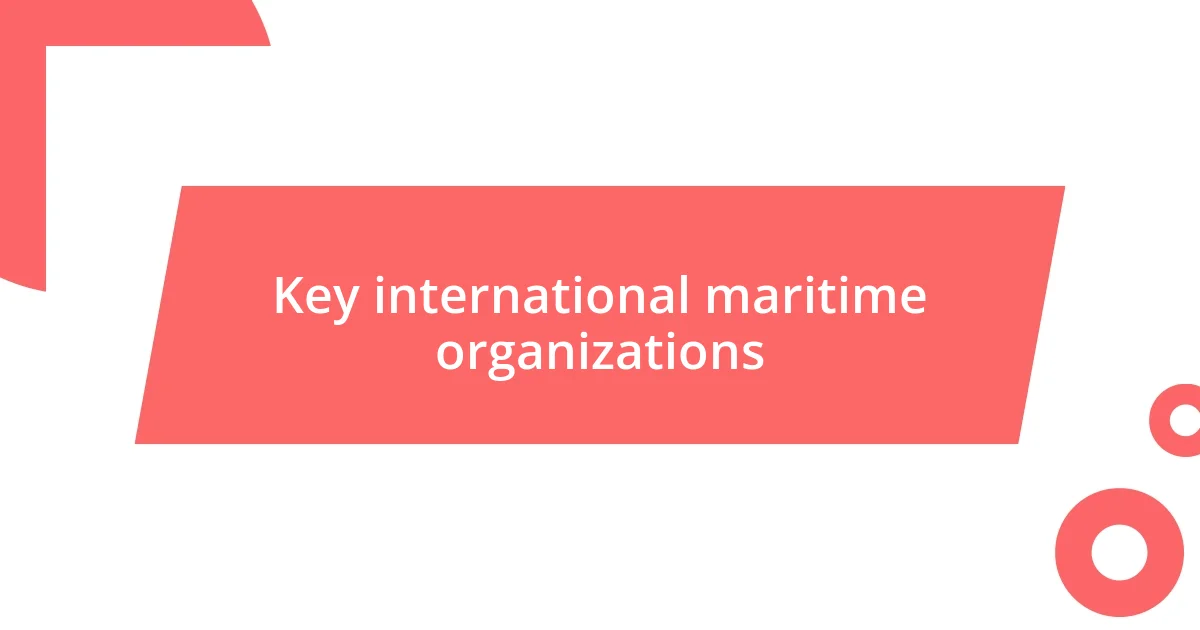
Key international maritime organizations
Key international maritime organizations play a crucial role in shaping the policies and frameworks that govern our oceans. From my experience, I’ve learned that these entities are not just bureaucratic institutions; they are platforms for collaboration and advocacy. Each organization brings unique strengths and perspectives to the table, driving negotiations for the benefit of global maritime safety and sustainability.
Here are some of the key players in this vital arena:
- International Maritime Organization (IMO): This United Nations agency focuses on regulating shipping, ensuring safety, and minimizing environmental impact.
- International Chamber of Shipping (ICS): Representing ship owners, the ICS advocates for balanced regulation that promotes the industry’s interests while ensuring high safety standards.
- World Maritime University (WMU): An educational institution aimed at supporting the maritime sector’s development, WMU provides training and research to enhance maritime knowledge.
- Regional Fisheries Management Organizations (RFMOs): These groups are essential for sustainable fishing practices and preserving marine biodiversity.
- Marine Environmental Protection Committee (MEPC): A vital part of the IMO, MEPC addresses pressing environmental issues like pollution and climate change.
Reflecting on my participation in meetings with these organizations, I was often struck by the diverse backgrounds of the delegates. For instance, during a session with the IMO, I remember a delegate from a small island nation sharing heartfelt stories about how rising sea levels were threatening their homes. The emotional weight of those accounts underscored the urgent need for international cooperation and prompted passionate discussions among attendees. It reinforced my conviction that these organizations, despite their formal structures, are ultimately about people and planet—something that remained with me long after those discussions concluded.
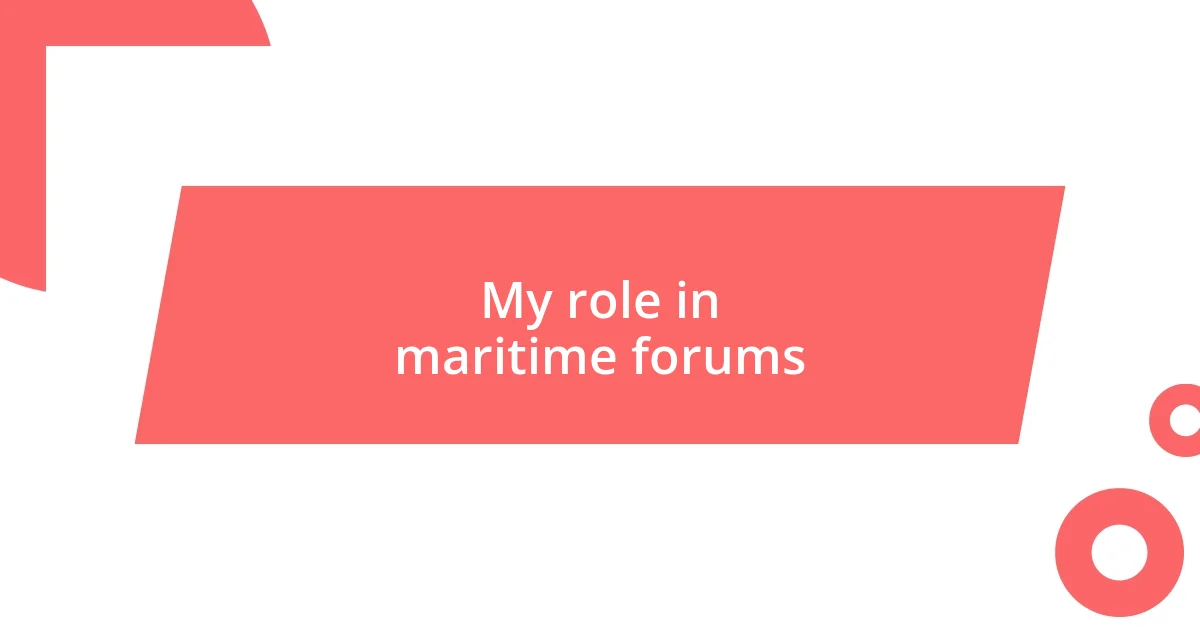
My role in maritime forums
My participation in maritime forums has been both enlightening and rewarding. During one memorable conference, I led a breakout session focused on the impact of climate change on shipping routes. The room was filled with experts from various countries, each bringing their unique viewpoint. I vividly recall gaining fresh perspectives when a colleague shared how melting Arctic ice was opening new pathways for trade. It prompted an engaging discussion on balancing economic opportunities with environmental responsibility. This experience emphasized the critical importance of dialogue in addressing such complex issues.
Another time, while attending a regional maritime summit, I found myself captivated by a compelling presentation about innovative technologies for maritime safety. As I shared my thoughts with fellow attendees during the networking session, it became clear how passionate everyone was about harnessing technology for the greater good. It reminded me of the excitement that comes from being part of a community dedicated to finding solutions. That sense of unity fueled my desire to advocate for collaborative partnerships, as I believe that empowering each other can lead to significant advancements in our industry.
Despite the formal settings of these discussions, I truly cherish the personal connections I’ve made. I distinctly remember chatting with a delegate who had dedicated his life to combatting illegal fishing. His fervor and dedication were contagious, stirring something deep within me. It reaffirmed my belief that our collective efforts, no matter how small, could really create ripples of change in the maritime world.
| Experience | Impact |
|---|---|
| Leading breakout sessions | Facilitated engaging discussions on climate change |
| Networking with experts | Encouraged collaborative partnerships for innovation |
| Connecting with passionate advocates | Stimulated a shared commitment to combat illegal fishing |
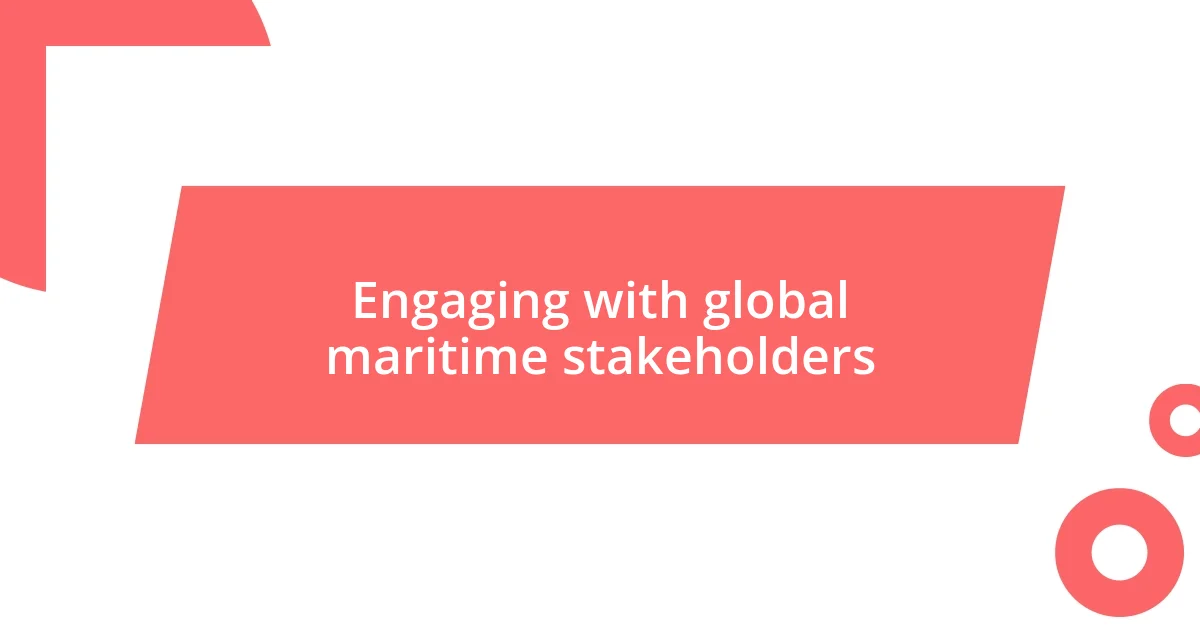
Engaging with global maritime stakeholders
Engaging with global maritime stakeholders has been a dynamic journey for me. During one particular international maritime conference, I remember feeling the energy as delegates from different nations actively exchanged ideas on sustainable shipping practices. I was so inspired to see how a vibrant dialogue could emerge from a simple question about balancing economic growth with environmental responsibility. The discussions truly highlighted the collective expertise and commitment present in the room, proving that we can tackle even the most complex challenges together.
On another occasion, while participating in a webinar hosted by a leading maritime organization, I was touched by a segment dedicated to the experiences of female leaders in the industry. Their stories of perseverance resonated deeply within me; it was a powerful reminder of the importance of diverse voices. Why is it that we often overlook the contributions of underrepresented groups? Listening to their insights reinforced my belief that fostering inclusivity can lead to innovative solutions in maritime governance—something I am passionate about advocating for.
In one memorable interaction with a stakeholder from a coastal community, I learned about the tangible impacts of marine pollution on their fishing livelihoods. The emotional weight of their struggles left a lasting impression on me. It was a wake-up call—reminding me that our discussions must transcend policy and statistics. It’s about real people, communities, and the future of our oceans. Engaging with stakeholders brings those human elements to the forefront, making our collective mission more profound and urgent.
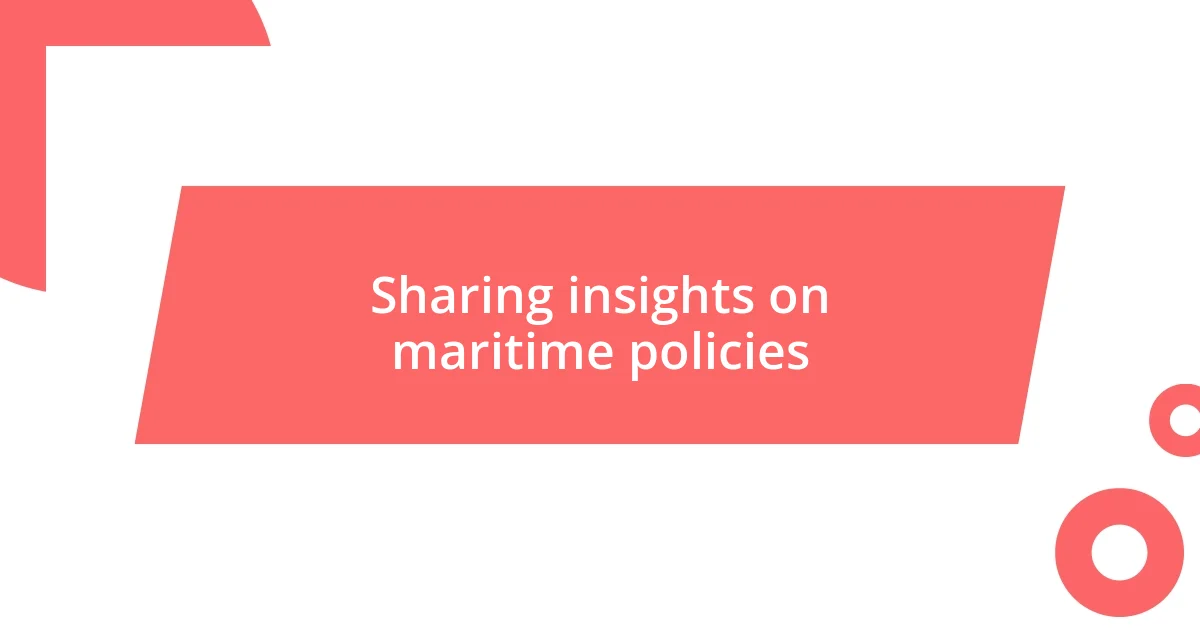
Sharing insights on maritime policies
Sharing insights on maritime policies is not just about exchanging information; it’s about cultivating understanding. I often think back to a panel discussion where I contributed my thoughts on the importance of harmonizing international regulations to ensure fair practices in shipping. During that deliberation, a representative from a developing nation voiced concerns about how regulatory discrepancies hindered their economic growth. That moment made me realize how interconnected our policies are and how essential it is to listen to varying perspectives.
I still reflect on a roundtable session where I shared my experiences regarding waste management policies in the maritime sector. An intriguing question was raised: how can we incentivize compliance among shipowners? This sparked a debate that underscored the necessity for innovative approaches, such as financial incentives or certifications. It reminded me that insight doesn’t just come from statistics; it’s rooted in real-world implications that affect livelihoods and environments.
One instance that stands out is when I discussed the impact of maritime security policies with a group of experts. Their passion was palpable as they recounted stories of piracy, pointing out how these incidents affected local economies. Listening to their insights made me realize the human side of policy decisions—that the outcomes of our discussions have the potential to uplift or harm entire communities. In that moment, I understood the weight of our contributions, and it fueled my commitment to advocate for policies that not only promote safety but also support sustainable development.
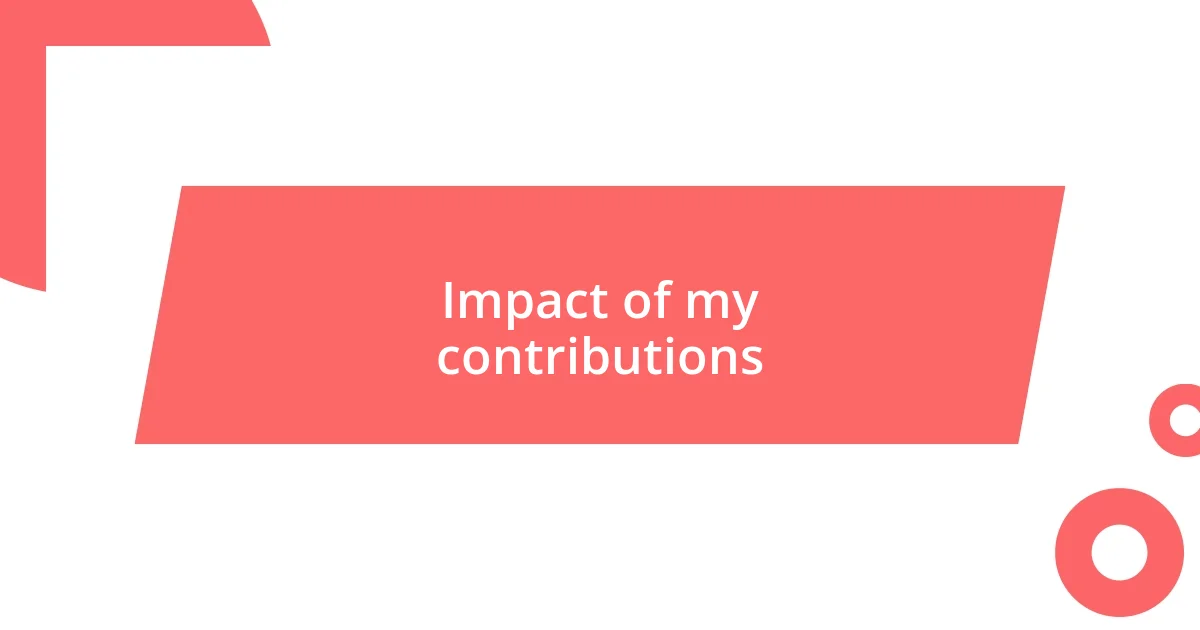
Impact of my contributions
The impact of my contributions has been profound, particularly when I reflect on a collaborative workshop where we brainstormed the future of maritime technology. I vividly remember sharing my thoughts about how innovations like autonomous shipping could help reduce human error and improve safety. It was exhilarating to witness the participants eagerly build upon my ideas, transforming a simple sharing of concepts into a powerful collective vision that could reshape our industry.
One discussion that sticks with me involved the importance of stakeholder engagement. During a session with diverse participants, I proposed the idea that incorporating feedback from local communities could enhance policy effectiveness. The nods of agreement around the room made me realize how essential it is for our discussions to remain grounded in real-world experiences. It left me wondering—how often do we prioritize these voices in our decision-making processes?
In another instance, I facilitated a dialogue on climate change’s impact on shipping routes. As I shared my insights on adaptive strategies, I saw the flicker of realization in many participants’ eyes. It was a moment of connection that sparked an emotional response—it became clear that our discussions could lead to actionable steps toward sustainability. This reinforced my belief that every contribution we make can ripple through the maritime sector, fostering a culture of proactive engagement and hope for a shared future.
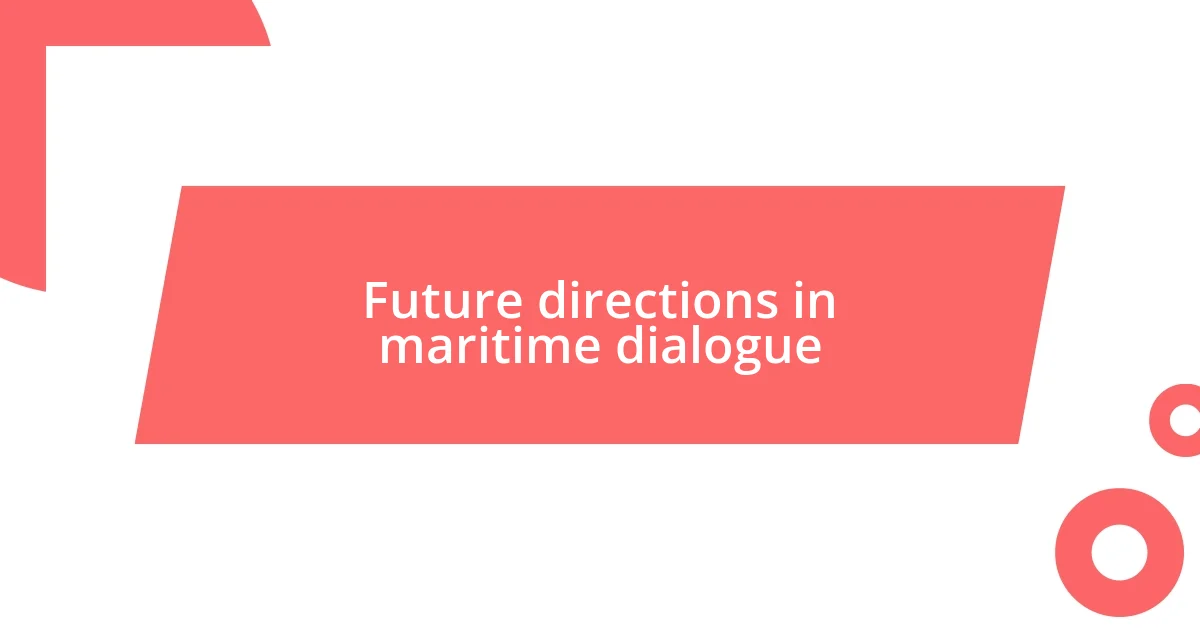
Future directions in maritime dialogue
As I consider the future of maritime dialogue, I can’t help but think about the critical role of emerging technologies. Recently, I took part in a brainstorming session where we examined how blockchain could transform supply chain transparency. The energy in the room was infectious—everyone recognized that this technology might bridge gaps between parties and streamline processes. How often do we find solutions hidden in plain sight, simply waiting for us to take that first step to explore them?
Moreover, I’ve realized that inclusivity is essential in shaping future discussions. During one of our meetings, I proposed creating an interactive platform dedicated to bringing underrepresented voices into the conversation. The reaction was overwhelmingly supportive; it seemed everyone understood the value of a rich tapestry of perspectives. It left me wondering—what might we achieve if every stakeholder had the opportunity to share their insights?
Reflecting on sustainable practices for the future, I shared my thoughts on fostering partnerships between the maritime industry and environmental organizations. The dialogue that ensued stirred something deep within me; I realized that collaboration could lead to innovative solutions for pressing ecological challenges. When we build bridges instead of walls, aren’t we truly setting the course for a sustainable maritime future? The potential for impactful change feels boundless when we dare to engage openly and creatively.









